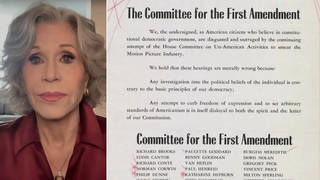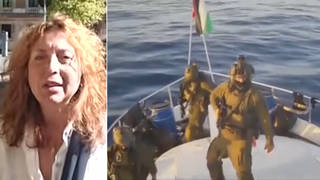
The Trump-era Title 42 policy has come to an end, but the Biden administration has instituted what human rights advocates say amounts to a new asylum ban. We get an update from the San Ysidro border crossing near San Diego, California, where hundreds of asylum seekers have been sleeping on the ground under trash bags and foil blankets, with many reporting they’ve not eaten in days. Pedro Rios, director of the American Friends Service Committee’s U.S.-Mexico Border Program, says Biden’s anti-asylum policies are “reconfiguring the concept of asylum to a point where it no longer offers the promise that it did post-World War II.”
Transcript
AMY GOODMAN: We begin today’s show at the U.S.-Mexico border, where the pandemic policy known as Title 42, which was used to expel nearly 3 million asylum seekers without due process, was lifted Thursday at midnight, three years after it was implemented by Trump. Homeland Security Secretary Alejandro Mayorkas announced the change while warning migrants of harsher consequences if they attempt to cross into the United States.
DHS SECRETARY ALEJANDRO MAYORKAS: Let me be clear: The lifting of the Title 42 public health order does not mean our border is open. In fact, it is the contrary. Our use of our immigration enforcement authorities under Title 8 of the United States Code means tougher consequences for people who cross the border illegally. Unlike under Title 42, an individual who is removed under Title 8 is subject to at least a five-year bar on reentry into the United States and can face criminal prosecution if they attempt to cross again. …
We are conducting dozens of removal flights per week, and we continue to increase our removal flight capability. We are increasing our efficiency and reducing processing times at the border.
AMY GOODMAN: As Title 42 ends, thousands of migrants have been stranded across the southern border hoping to be processed and allowed into the United States. This is a Venezuelan asylum seeker near the San Ysidro border crossing in California.
VENEZUELAN ASYLUM SEEKER: [translated] We got off one train to take another. The situation is challenging. All of us who are here are from Venezuela. Many migrants are in the same situation. It is difficult and complex. Every time they put more and more obstacles in our way. We will continue to move forward.
AMY GOODMAN: Most of the thousands seeking entry to the United States will likely be blocked, as the Biden administration begins its implementation of what immigration rights advocates say is another ban on the right to seek asylum under both domestic and international law. A policy announced this week would force most asylum seekers to request refugee status in another country, like Mexico, before reaching the U.S., or face quick deportation. The ACLU and others are suing over the rule. Another directive requires asylum applicants to make their appointments on a Customs and Border Protection smartphone app that asylum seekers say is riddled with software bugs and raises serious concerns over privacy.
Meanwhile, migrant detentions at the U.S.-Mexico border are hitting record highs as Title 42 ends. Border Patrol authorities said Wednesday they detained a record 28,000 people.
For more, we go to San Diego, which is near the San Ysidro border crossing in California, where hundreds of asylum seekers have been sleeping on the ground under trash bags and foil blankets, with many reporting they haven’t eaten in days. We’re joined by Pedro Rios, director of the American Friends Service Committee’s U.S.-Mexico Border Program.
Welcome back to Democracy Now!, Pedro. Can you talk about the situation as of midnight last night? But, of course, this has been building up.
PEDRO RIOS: Thank you, Amy.
Yes. What we are seeing on the ground is that there are many people who are wanting to seek asylum, and as they cross into what is known as the enforcement zone, which is between the primary and the secondary border walls, is that they are essentially being left there. And Border Patrol is not providing — is not abiding by its national standards to ensure that they have safety, that they get food, that they have plenty of water and shelter. At this time, what we see is, on a rotating basis, at least 400 people, asylum seekers, with many children, who have been abandoned in this location until — and waiting until Border Patrol picks them up.
AMY GOODMAN: So, can you talk about how the Biden administration is dealing with this? And talk about what people are telling you on the border, what they understand has changed.
PEDRO RIOS: The Biden administration is dealing with this very poorly. Essentially, it’s placing even more obstacles for people that are fleeing harm, by placing bans, by ensuring that people don’t have a way to seek asylum, by forcing people to have to cross through these inhumane ways, and, furthermore, ensuring that they are hungry, that they are thirsty.
And when we speak with migrants on the ground, they tell us that they have no other options. They have tried using the CBP One application on their phone, and oftentimes it just doesn’t work for them. There aren’t many opportunities for them to present themselves at a port of entry to seek asylum, and, therefore, they have been forced, especially under the application of Title 42, to seek other, more dangerous ways of attempting to cross into the U.S. to turn themselves in to U.S. authorities to seek asylum.
AMY GOODMAN: Pedro, you tweeted video of a CBP readiness exercise at the San Ysidro border, that you said was meant to normalize violence as an acceptable response to people seeking asylum. Can you explain?
PEDRO RIOS: CBP, so, Customs and Border Protection, especially under Trump, and then extended under President Biden, have conducted these readiness exercises, where they have several hundred CBP agents that go out at the port of entry, they close many lanes and, for sometimes up to 45 minutes, will hold these exercises. It’s a show of force that use sound grenades — they use mock grenades, as well — where they are meant to demonstrate the violence that they would use if there were a large group of people attempting to cross at that point at the port of entry. That has not occurred in many years.
But what it does is, it’s a form of collective punishment, because it makes it so violence becomes the acceptable form to respond to people that are seeking safety from harm. And it also conditions other border crossers to blame migrants, asylum seekers, from having to wait even more time at crossing the U.S.-Mexico border. This is something that we should not tolerate. It’s not something that should be acceptable as a response to anyone who is seeking safety from the extreme migration patterns that they have been a part of and they have experienced over the course of attempting to seek safety in the United States.
AMY GOODMAN: Over the last month, Pedro, about a hundred asylum seekers have been stuck in a kind of open prison between San Diego and Mexico. Can you lay out the human rights standards for people seeking asylum at the border and whether that Customs and Border Patrol is seeking these standards when they hold people there with no food, with hardly any water? Community organizers like yourself out there all day and night trying to hand out food, baby supplies, charging phones, etc.
PEDRO RIOS: Yeah. So, to describe the scenario, we have people that have crossed into the U.S. in the space known as the enforcement zone. This is between the primary and the secondary border walls. These are 30-feet-high walls where they are intending to present themselves to Border Patrol agents to say, “I fear for my life. I want to seek asylum.” Border Patrol has to comply with national standards that say people need to be provided with basic food, with water, with shelter, and kept away from harm.
What we are seeing on the ground at this moment is that there are anywhere between 400 to 500 asylum seekers, including many children, who are kept in that location. Border Patrol has pushed people into that location. They have — sometimes they will take their shoelaces away from them. Sometimes they will move them into that location. And that is essentially an open-air area without any way of receiving any food, with the exception of civil society that has gathered there and has been providing hot meals for them. What we saw a couple days ago, for instance, is that Border Patrol provided a single granola bar during the entire day. How is that possible to do that to children, especially those that are very little, who don’t know anything about what’s going on at the moment?
And what we are seeking is for the Border Patrol to comply with these standards. These are standards that were developed back in 2015 after months-long conversations, that they need to comply with basic human rights of ensuring that people under their custody are kept in safety. We are not seeing that happening at this moment at the U.S.-Mexico border in San Diego.
AMY GOODMAN: You’re in California. In Texas, the Department of Public Safety and military were seen placing razor wire along the Rio Grande River in Brownsville to reinforce the border. Can you talk about the walls that President Biden said he wouldn’t be building, but what’s happening there?
PEDRO RIOS: What we are seeing is that there are several locations where President Biden is moving forward with building border walls. And these border walls resemble Trump’s border walls in terms of the features, such as the height, the type of material that is used. But sometimes they’re being branded under another name. In Texas, they are being called “levee walls,” but they mirror the same exact type of prototypes that President Trump at the time was proclaiming as completely unclimbable.
In San Diego, for instance, in the Friendship Park area, he is proceeding with building two 30-foot border walls that will completely decimate the experience that families have had when they arrive at Friendship Park and are able to meet their loved ones, albeit divided by the primary border wall, but at least have that experience. The visual landscape will be transformed by National Guard in — that is there, will be completely destroyed.
And it’s something that we are asking President Biden to stop building Donald Trump’s border walls. But we don’t see any type of leeway in that direction. And we’re hoping that civil society continues to lift their voices against these 30-foot border walls that are completely destructive.
AMY GOODMAN: Can you explain the harsher criminal consequences for those who cross, which means profit for the private detention centers, the jails along the border?
PEDRO RIOS: So, for individuals now, after — post-Title 42 era, individuals that cross without inspection, who want to seek asylum, could be banned from doing so for five years. And this is something that we have not ever seen in terms of the decimation of what the promise of asylum was, that no person should be turned away and placed in greater danger. If someone is banned from seeking asylum, it absolutely ensures that that person likely will face harm, either in their home country or in another country.
There are the third-country bans that we are seeing, what we are now calling “the Biden bans.” If someone did not seek asylum in a country that they transited through before arriving at the U.S.-Mexico border, then it’s likely that the United States will prevent them and block them from seeking asylum in the United States because they did not seek asylum in a third country that they passed through.
All of these anti-asylum measures are reconfiguring the concept of asylum to a point where it no longer offers the promise that it did post-World War II, where countries around the world were turning people back, and people were dying as a result of not having safe harbor in other countries that should have accepted them.
AMY GOODMAN: And can you talk about what is happening now? I mean, this is not just happening along the border. We’re broadcasting from New York. Mayor Adams has talked about possibility of putting migrants in a shuttered prison, have already shipping people out of New York City who were brought to New York City, to places like Newburgh, New York. This is happening across the country, in Chicago and other places. What do you demand the Biden administration do at this point, Pedro Rios?
PEDRO RIOS: That’s correct, Amy. And so, what we are seeing is that President Biden is placing resources to further militarize the border by sending 1,500 troops to the border. We don’t know what their function will be just yet, except that they’re saying they will be having administrative tasks. But they do then add to the National Guard troops that certain states like Texas already have at the border. And this addition of additional military troops just paints a picture that migrants will not be welcomed with dignity, but, in fact, they will be welcomed with extreme force, that they will be turned away.
And jurisdictions in other states, such as New York, should be receiving many more resources to expand the shelter services, to ensure that civil society has the means to transport people, to place asylum seekers in safe houses, at safe places, in safe shelters. We’re not seeing the same commitment or dedication from the Biden administration to support those border counties and other states, like New York, to have the resources necessary to provide the support and help that asylum seekers need at the moment.
AMY GOODMAN: Finally, Trump just said he would — if he were president again, he would separate families again and also engage in the largest deportation of migrants in history. But before him, President Obama was dubbed the “deporter-in-chief” by his own immigrant rights allies. Of course, that was the Obama-Biden administration. Is Biden continuing, do you think, this policy, that has gone from Obama to Trump through right now to Biden?
PEDRO RIOS: I think President Biden is, unfortunately. And I think this is — it’s not specific to the Republican Party. What I have been able to see and how I qualify this is that both the Republican and the Democratic Party just have never known how to properly center human rights for people that are seeking safety in the United States. In fact, it becomes a political football, where the harsher you can be on border issues, the less protective you can be to migrants means that that is a way to project their political campaigns and their political goals, undermining the premise that people should be treated with dignity and respect. And that’s what we are seeing now under the new Biden transit ban, under the continued construction of 30-foot border walls at Friendship Park and elsewhere, and just the rejection of treating people with dignity as they are seeking safety in the United States.
AMY GOODMAN: Pedro Rios, I want to thank you for being with us, director of the American Friends Service Committee’s U.S.-Mexico Border Program, speaking to us from San Diego, California.
Coming up, a group of House Democrats are urging the Biden administration to lift sanctions on Venezuela and Cuba, which they say are driving people to leave their homes and head to the United States out of economic desperation. Stay with us.
[break]
AMY GOODMAN: “Be Reasonable,” performed by Barbara Dane in Democracy Now!'s studios in 2018. The legendary singer, activist turns 96 years old today. We'll be posting an extended interview with Barbara Dane on our website today. Check it out at democracynow.org. Happy birthday, Barbara Dane!












Media Options